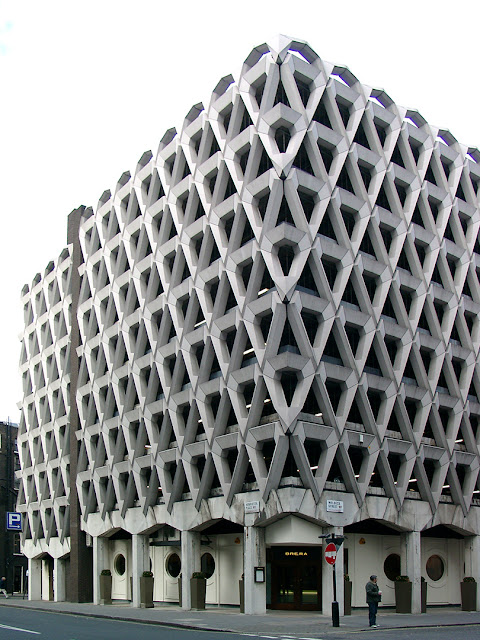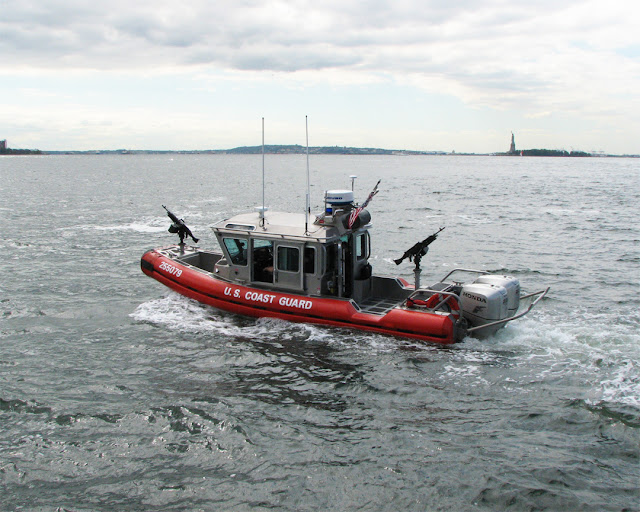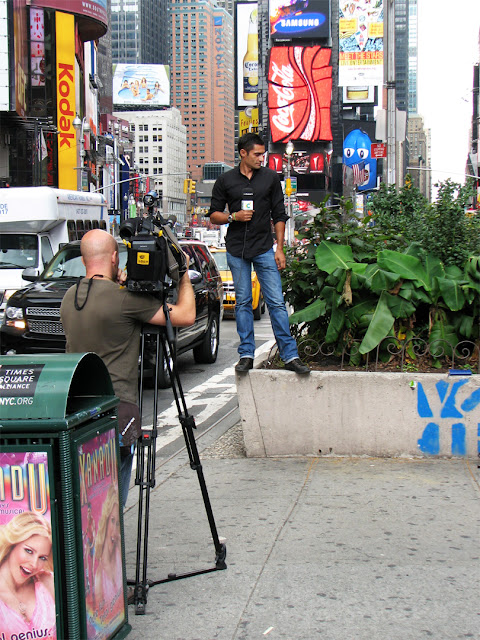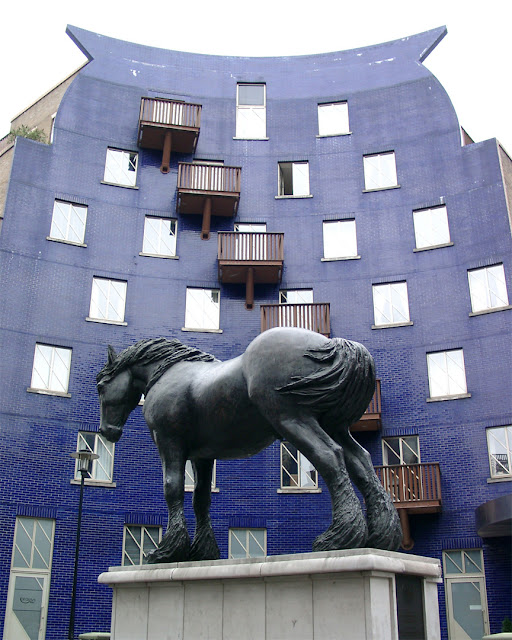Monday, August 31, 2009
Sunday, August 30, 2009
Athenaeum Club
Athenaeum Club by Decimus Burton, 1830
Waterloo Place / Pall Mall
London, January 2007
“The Athenaeum is a private members' club in London, founded in 1824. It is primarily a club for men and women with intellectual interests, and particularly (but not exclusively) for those who have attained some distinction in science, engineering, literature or the arts. Humphry Davy and Michael Faraday were the first chairman and secretary and 51 Nobel Laureates have been members. The clubhouse is located at 107 Pall Mall at the corner of Waterloo Place. It was designed by Decimus Burton in the Neoclassical style, and built by the company of Decimus's father, James Burton, the pre-eminent London property developer. Decimus was described by architectural scholar Guy Williams as ‘the designer and prime member of the Athenaeum, one of London's grandest gentlemens' clubs’. The clubhouse has a Doric portico, above which is a statue of the classical goddess of wisdom, Athena, from whom the club derives its name. The bas-relief frieze is a copy of the frieze of the Parthenon in Athens. The club's facilities include an extensive library, a dining room known as the coffee room, a Morning Room, a drawing room on the first floor, a restored smoking room (smoking is no longer permitted) on the upper floor, and a suite of bedrooms.” (Athenaeum Club, Wikipedia)
Saturday, August 29, 2009
Friday, August 28, 2009
St Patrick's Church
St Patrick's church
Soho Square
London, January 2007
“St Patrick's Church is a large Roman Catholic parish church in Soho Square, London. St Pat's (as it is informally known) was consecrated as a chapel in a building behind Carlisle House on 29 September 1792, one of the first Catholic buildings allowed in Great Britain after the Reformation. The present church building was built between 1891 and 1893, to designs by John Kelly of Leeds, and replaced the earlier and smaller chapel built by Father Arthur O'Leary in the 1790s. The church has an unusual longish shape due to plot constrictions given at that time. The building is constructed out of bricks with a bell-tower. It is Grade II listed. The main entrance has a Roman-style porch with Corinthian columns.” (St Patrick's Church, Wikipedia)
Thursday, August 27, 2009
Wednesday, August 26, 2009
Tuesday, August 25, 2009
Broadwick House
Broadwick House by Rogers Stirk Harbour + Partners, 2002
Broadwick Street, Soho
London, January 2007
“Broadwick House stands in the Soho conservation area. The site is an island, with thoroughfares on all four sides. To the east, it abuts Berwick Street, with one of London's best-known street markets. Neighbouring buildings range from Georgian town houses to high rise apartments and modern office blocks. Into this diverse context, Broadwick House introduces an element of rationality and urbanity. By concentrating service cores on the western edge, well-lit and highly transparent office floors are created behind fully glazed facades. Energy efficiency is ensured with the provision of solar performance glazing, in conjunction with external shading devices and motorised blinds. Ground floor facades are set back to facilitate pedestrian movement, while the fifth floor steps back to provide outdoor terraces. The most distinctive element of the scheme is the double-height space set below the great arched roof, affording spectacular views over London's West End.” (Broadwick House, Archello)
Monday, August 24, 2009
Sunday, August 23, 2009
Saturday, August 22, 2009
Welbeck Street car park
Welbeck Street car park
Welbeck Street, Marylebone
London, January 2007
“Welbeck Street car park was an architecturally notable car park built in the Brutalist style that was found in Marylebone, just north of Oxford Street, in the City of Westminster, London. The entrance was on the east side in Welbeck Street and it also borderered Henrietta Place in the south and Marylebone Lane in the west. The car park, designed by Michael Blampied and Partners, was completed in 1970 for the use of the nearby Debenhams store using a design of tessellated concrete polygons. In 2016, the site was sold to Shiva Hotels who were given permission to demolish the car park in 2017. Despite opposition from architects and The Twentieth Century Society, Historic England decided not to register the car park as a listed building and demolition of the structure began in October 2019.” (Welbeck Street car park, Wikipedia)
Friday, August 21, 2009
Thursday, August 20, 2009
Wednesday, August 19, 2009
Tuesday, August 18, 2009
Le Passe-muraille
Le Passe-muraille (The passer-through-walls) by Jean Marais, 1989
Place Marcel-Aymé, Montmartre
Quartier des Grandes-Carrières, 18th arrondissement
Paris, July 2009
Monday, August 17, 2009
Sunday, August 16, 2009
St Peter, Vere Street
St Peter Church by James Gibbs, 1722 Vere Street, Marylebone
London, January 2007
“St Peter, Vere Street, known until 1832 as the Oxford Chapel after its founder Edward Harley, 2nd Earl of Oxford and Earl Mortimer, is a former Anglican church off Oxford Street, London. It has sometimes been referred to as the Marybone Chapel or Marylebone Chapel. The chapel was designed by James Gibbs in 1722. It was originally intended as a Chapel of Ease to supplement the parish church for the growing parish of Marylebone. The building was acquired by the Crown from the Portland Estate in 1817 and was dedicated to St Peter in 1832. In 1830, Parliament had passed an ‘Act for endowing the Parish Church of Newborough in the County of Northampton, and Three Chapels, called Portland Chapel, Oxford Chapel, and Welbeck Chapel, situate in the Parish of Saint Mary-le-bone, in the County of Middlesex, and also a Chapel erected on Sunk Island in the River Humber’.” (St Peter, Vere Street, Wikipedia)
Saturday, August 15, 2009
Friday, August 14, 2009
Royal Society of Medicine
Royal Society of Medicine
Wimpole Street, Marylebone
London, January 2007
“In 1910 the Society purchased 2-5 Henrietta Street, the site at the corner of Henrietta Place and Wimpole Street, which was opened by King George V and Queen Mary in May 1912. Until then, the Society met at 15 Cavendish Square, having moved out of Hanover Square two years earlier. The building at 1 Wimpole Street was designed by architects John Belcher and J. J. Joass. In the first nine months membership increased from 1,322 to 2,025.” (Royal Society of Medicine, Wikipedia)
Thursday, August 13, 2009
Wednesday, August 12, 2009
Prospero and Ariel
Prospero and Ariel by Eric Gill, 1932
Broadcasting House
Portland Place
London, January 2007
“For the Hague and Gill press he created the Joanna typeface, which was eventually adapted for commercial use by Monotype. He completed ‘The Four Gospels’, widely considered to be the finest of all the books produced by the Golden Cockerel Press, and began working on the sculpture ‘Prospero and Ariel’ for the BBC's Broadcasting House in London. Throughout 1931 and into 1932, Gill worked on ‘Prospero and Ariel’, and four other works for the BBC, on site in central London. Carving in the open air up on scaffolding in the middle of London further increased Gill's public profile. Although Gill had accepted the BBC's choice of subject matter when he took the commission, he did not see its relevance and frequently claimed that the figures he created represented God the Father and God the Son, the latter complete with the marks of the stigmata.” (Eric Gill, Wikipedia)
Tuesday, August 11, 2009
Monday, August 10, 2009
Patrouille de France
Patrouille de France (French Acrobatic Patrol) flyover on Bastille Day
AAvenue des Champs-Élysées
Quartier des Champs-Élysées, 8th arrondissement
Paris, July 2009
Sunday, August 9, 2009
Saturday, August 8, 2009
One Kemble Street
One Kemble Street
Off Kingsway, Camden
London, January 2007
“One Kemble Street and Civil Aviation Authority House (CAA House), originally known jointly as Space House, is an architecturally notable building off Kingsway in the London Borough of Camden. It is a grade II listed building with Historic England. Like nearby Centre Point, it was built for the developer Harry Hyams as part of the 1960s commercial property boom and kept empty for several years after completion. The building was designed by George Marsh, a partner in Richard Seifert's architectural firm, for Oldham Estates, the vehicle for the developer Harry Hyams, and built between 1964 and 1968 by Robert McAlpine and Sons. Marsh had also designed the nearby Centre Point, also for Hyams. The consulting engineers were C.J. Pell & Partners.” (One Kemble Street, Wikipedia)
Friday, August 7, 2009
Thursday, August 6, 2009
Wednesday, August 5, 2009
Tuesday, August 4, 2009
Captain James Cook
Captain James Cook by Thomas Brock, 1914
The Mall
London, January 2007
“A bronze statue of Captain James Cook by Thomas Brock is located near Admiralty Arch on the south side of The Mall in London, United Kingdom. The statue was completed in 1914 and is maintained by The Royal Parks. It is mounted on a stone plinth. The idea for the memorial was first proposed by Joseph Carruthers, the former premier of New South Wales, who had written to The Times complaining of the lack of a statue to Captain Cook in London. The completed work was unveiled on 7 July 1914 by Prince Arthur, Duke of Connaught and Strathearn.” (Statue of Captain James Cook, Wikipedia)
Monday, August 3, 2009
Sunday, August 2, 2009
Cadenas d'amour
Cadenas d'amour (Love padlocks)
Passerelle Léopold-Sédar-Senghor (Solférino footbridge)
7th arrondissement
Paris, July 2009
Saturday, August 1, 2009
Subscribe to:
Comments (Atom)































